-
16 May 1517 - Margaret Tudor returned to Scotland

16 May 1529-Martin Luther Publishes His Small Catechism

16 May 1532 - Sir Thomas More resigns as Lord Chancellor of England.

16 May 1536
Archbishop Cranmer visited Queen Anne Boleyn at the Tower of London.

Sir William. Kyngston to Thomas Cromwell
Was with the King today, and declared the petition of lord Rochford, wherein I was answered. The said Lord desires to speak with you on a matter which touches his conscience. I wish to know your pleasure, because of my promise to him, and also to know the King's pleasure touching the Queen, as well for her confession as for the preparation of scaffolds. The King told me that my lord of Canterbury should be her confessor, and he was here today with her. "The time is short, for the King supposeth the gentlemen to die tomorrow, and my lord of Rochford, with the residue of gentlemen, and as yet without Doctor Allryge, which I look for;" but I have told him to be ready to suffer tomorrow, and so he accepts it very well, and will do his best to be ready, "notwithstanding, he would have received his rights, which hath not been used, and in especial here." Yet this day at dinner the Queen said she would go to "anonre" (a nunnery) , and is in hope of life.
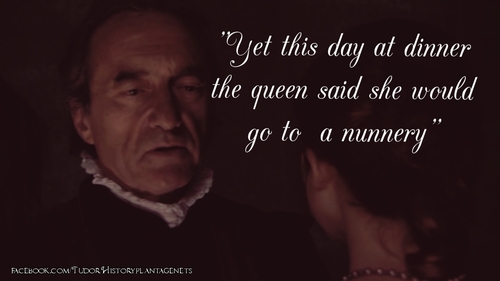
George Boleyn, Sir Francis Weston, Sir Henry Norris, Sir William Brereton and Mark Smeaton prepared for their deaths by confessing their sins to Dr Allryge (or Alridge), the chaplain sent to them(Read more: http://www.theanneboleynfiles.com/16-may-1536-men-prepare-death/#ixzz31rlgB4c6)
16 May 1566 - Death of Patrick Ruthven, 3rd Lord Ruthven.He played an important part in the political intrigues of the 16th century and in the murder of David Riccio, Mary, Queen of Scots’s private secretary. He succeeded to the lordship in December 1552. The Ruthven lordship encompassed the offices of Provost and Constable of Perth, and Sheriff of Strathearn.
16 May 1568 - Mary Queen of Scotland flees to England

16 May 1578 - Birth of Everard Digby.He was a member of the group of provincial English Catholics who planned the failed Gunpowder Plot of 1605. Although he was raised in a Protestant household, and married a Protestant, Digby and his wife were converted to Catholicism by the Jesuit priest John Gerard. In the autumn of 1605 he was part of a Catholic pilgrimage to the shrine of St Winefride's Well in Holywell. About this time he met Robert Catesby, a religious fanatic who planned to blow up the House of Lords with gunpowder, killing James I. Catesby then planned to incite a popular revolt, during which a Catholic monarch would be restored to the English throne.
More history:
16 May 1412- Giovanni Maria Visconti,duke of Milan was stabbed to death at the door of a church

16 May 1527 – The Florentines drive out the Medici for a second time and Florence re-establishes itself as a republic.
16 May 1547 - Protestant German monarch surrenders to Karel in Wittenberg
16 May 1770-Marriage of Marie Antoinette and the future King Louis XVI of France.
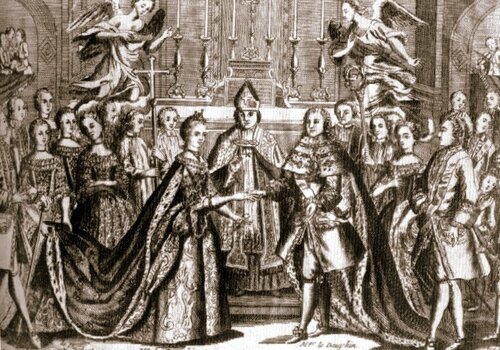
source:http://www.thetudorswiki.com/,wikipedia,http://www.british-history.ac.uk/,the anne boleyn files
-
15 May 1464-Execution of Henry Beaufort, 3rd Duke of Somerset.He was an important Lancastrian military commander during the English Wars of the Roses. He is sometimes numbered the 2nd Duke of Somerset, since the title was re-created for his father after his uncle died. He also held the subsidiary titles of 5th Earl of Somerset, 2nd Marquess of Dorset and 2nd Earl of Dorset.
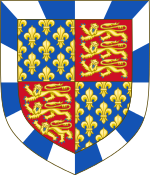
15 May 1536
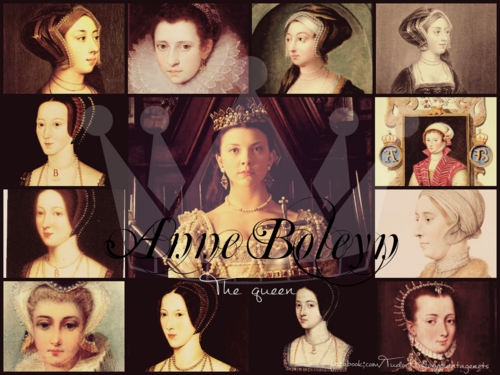
Trial of Anne Boleyn and Lord Rocheford
Record of pleas held at the Tower of London before Thos. duke of Norfolk, treasurer and earl marshal, lord high steward, citing:—
(1.) Patent appointing the said Duke steward of England hac vice for the trial of queen Anne and lord Rocheford. Westm., 12 May 28 Hen. VIII.
(2.) Mandate to Sir John Baldewyn, Sir Ric. Lister, Sir John Porte, Sir John Spelman, Sir Walter Luke, Sir Anth. Fitzherbert, Sir Thos. Englefeld, and Sir Will. Shelley, special commissioners of Oyer and Terminer for Middlesex, to return all indictments found against queen Anne and lord Rocheford. Westm., 13 May 28 Hen. VIII.
(3.) Similar mandate to Sir John Baldewyn, Sir Walter Luke, Sir Anth. Fitzherbert, and Sir Will. Shelley, special commissioners for Kent. Westm., 13 May 28 Hen. VIII.
(4.) Mandate to Sir Will. Kyngestone, constable of the Tower, to bring queen Anne and lord Rocheford before the Lord High Steward when required. Westm., 13 May 28 Hen. VIII.
(5.) The Lord High Steward issued his precept, 13 May, to Sir John Baldewyn and his fellows in Middlesex, to return the indictments at the Tower before him on Monday, 15 May, and a similar precept to Sir J. Baldewyn, Luke, and his fellows in Kent; a third precept to the constable of the Tower to bring queen Anne and lord Rocheford that day before him; and a fourth to Ralph Felmyngham, serjeant-at-arms, to summon such and so many lords of the kingdom, peers of the said queen Anne and lord Rocheford, by whom the truth may appear.
(6.) Pleas held before the duke of Norfolk, steward of England, at the Tower, on Monday, 15 May 28 Hen. VIII.
The justices bring in the indictments for Middlesex and Kent, Sir Will. Kingston produces the prisoners, and Ralph Felmyngham declares that he has summoned the peers. Proclamation being then made, the peers answer to their names; viz., Charles duke of Suffolk, Hen. marquis of Exeter, Will. earl of Arundel, John earl of Oxford, Hen. earl of Northumberland, Ralph earl of Westmoreland, Edw. earl of Derby, Hen. earl of Worcester, Thos. earl of Rutland, Rob. earl of Sussex, Geo. earl of Huntingdon, John lord Audeley, Thos. lord La Ware, Hen. lord Mountague, Hen. lord Morley, Thos. lord Dacre, Geo. lord Cobham, Hen. lord Maltravers, Edw. lord Powes, Thos. lord Mount Egle, Edw. lord Clynton, Will. lord Sandes, Andrew lord Wyndesore, Thos. lord Wentworth, Thos. lord Burgh, and John lord Mordaunt.
(7.) Indictment found at Westminster on Wednesday next after three weeks of Easter, 28 Hen. VIII. before Sir John Baldwin, &c., by the oaths of Giles Heron, Roger More, Ric. Awnsham, Thos. Byllyngton, Gregory Lovell, Jo. Worsop, Will. Goddard, Will. Blakwall, Jo. Wylford, Will. Berd, Hen. Hubbylthorn, Will. Hunyng, Rob. Walys, John England, Hen. Lodysman, and John Averey; who present that whereas queen Anne has been the wife of Henry VIII. for three years and more, she, despising her marriage, and entertaining malice against the King, and following daily her frail and carnal lust, did falsely and traitorously procure by base conversations and kisses, touchings, gifts, and other infamous incitations, divers of the King's daily and familiar servants to be her adulterers and concubines, so that several of the King's servants yielded to her vile provocations; viz., on 6th Oct. 25 Hen. VIII., at Westminster, and divers days before and after, she procured, by sweet words, kisses, touches, and otherwise, Hen. Noreys, of Westminster, gentle man of the privy chamber, to violate her, by reason whereof he did so at Westminster on the 12th Oct. 25 Hen. VIII.; and they had illicit intercourse at various other times, both before and after, sometimes by his procurement, and sometimes by that of the Queen. Also the Queen, 2 Nov. 27 Hen. VIII. and several times before and after, at Westminster, procured and incited her own natural brother, Geo. Boleyn, lord Rocheford, gentleman of the privy chamber, to violate her, alluring him with her tongue in the said George's mouth, and the said George's tongue in hers, and also with kisses, presents, and jewels; whereby he, despising the commands of God, and all human laws, 5 Nov. 27 Hen. VIII., violated and carnally knew the said Queen, his own sister, at Westminster; which he also did on divers other days before and after at the same place, sometimes by his own procurement and sometimes by the Queen's. Also the Queen, 3 Dec. 25 Hen. VIII., and divers days before and after, at Westminster, procured one Will. Bryerton, late of Westminster, gentleman of the privy chamber, to violate her, whereby he did so on 8 Dec. 25 Hen. VIII., at Hampton Court, in the parish of Lytel Hampton, and on several other days before and after, sometimes by his own procurement and sometimes by the Queen's. Also the Queen, 8 May 26 Hen. VIII., and at other times before and since, procured Sir Fras. Weston, of Westminster, gentleman of the privy chamber, &c., whereby he did so on the 20 May, &c. Also the Queen, 12 April 26 Hen. VIII., and divers days before and since, at Westminster, procured Mark Smeton, groom of the privy chamber, to violate her, whereby he did so at Westminster, 26 April 27 Hen. VIII.
Moreover, the said lord Rocheford, Norreys, Bryerton, Weston, and Smeton, being thus inflamed with carnal love of the Queen, and having become very jealous of each other, gave her secret gifts and pledges while carrying on this illicit intercourse; and the Queen, on her part, could not endure any of them to converse with any other woman, without showing great displeasure; and on the 27 Nov. 27 Hen. VIII., and other days before and after, at Westminster, she gave them great gifts to encourage them in their crimes. And further the said Queen and these other traitors, 31 Oct. 27 Hen. VIII., at Westminster, conspired the death and destruction of the King, the Queen often saying she would marry one of them as soon as the King died, and affirming that she would never love the King in her heart. And the King having a short time since become aware of the said abominable crimes and treasons against himself, took such inward displeasure and heaviness, especially from his said Queen's malice and adultery, that certain harms and perils have befallen his royal body.
And thus the said Queen and the other traitors aforesaid have committed their treasons in contempt of the Crown, and of the issue and heirs of the said King and Queen.
(8.) Record of indictment and process before Baldewyn, Luke, and others, in co. Kent.
The indictment found at Deptford, on Thursday, 11 May 28 Hen. VIII., is precisely similar in character to the Middlesex indictment, except as regards times and places; viz., that the Queen at Estgrenewyche, 12 Nov. 25 Hen. VIII., and divers days before and since, allured one Hen. Noreys, late of Est Grenewyche, to violate her, whereby he did so on the 19 Nov., &c.; that on 22 Dec. 27 Hen. VIII., and divers other days, at Eltham, she allured Geo. Boleyn, lord Rocheford, &c., whereby he did so, 29 Dec., &c.; that on the 16 Nov. 25 Hen. VIII., and divers, &c., at Est Grenewyche, she allured one Will. Bryerton, late of Est Grenewyche, &c., whereby he did so, 27 Nov., &c.; that on the 6 June 26 Hen. VIII., &c., at Est Grenewyche, she allured Sir Fras. Weston, &c., whereby he did so, 20 June, &c.; that on the 13 May 26 Hen. VIII. &c., at Est Grenewyche, she allured Mark Smeton, &c., whereby he did so, 19 May 26 Hen. VIII.
And further that the said Boleyn, &c. grew jealous of each other; and the Queen, to encourage them, at Eltham, 31 Dec. 27 Hen. VIII., and divers times before and since, made them presents, &c.; that the Queen and the others, 8 Jan. 27 Hen. VIII., conspired the King's death, &c., and that she promised to marry one of the traitors whenever the King was dead, affirming she would never love him, &c.
And afterwards, Monday, 15 May, queen Anne comes to the bar before the Lord High Steward in the Tower, in the custody of Sir Will. Kingston, pleads not guilty, and puts herself on her peers; whereupon the said duke of Suffolk, marquis of Exeter, and other peers, are charged by the High Steward to say the truth; and being examined from the lowest peer to the highest, each of them severally saith that she is guilty.
Judgment:—To be taken to prison in the Tower, and then, at the King's command, to the Green within the Tower, and there to be burned or beheaded as shall please the King.
The same day, lord Rocheford is brought before the High Steward in the custody of Sir Will. Kingston, and pleads not guilty. The peers are charged, with the exception of the earl of Northumberland, who was suddenly taken ill, and each of them severally saith that he is guilty.
Judgment:—To be taken to prison in the Tower, and then drawn through the city of London, to the gallows at Tyburn, &c., as usual in high treason.

Original parchment record of the trial of Anne Boleyn and her brother, George Boleyn
Anne and George Boleyn were tried separately in the Tower of London.The Duke of Norfolk, pronounced the sentence:
“Because thou hast offended against our sovereign the King’s Grace in committing treason against his person, and here attainted of the same, the law of the realm is this, that thou hast deserved death, and thy judgment is tis: that thou shalt be burned here within the Tower of London on the Green, else to have thy head smitten off, as the King’s pleasure shall be further known of the same.”
She was accused of adultery, incest, and high treason.By the Treason Act of Edward III, adultery on the part of a queen was a form of treason (presumably because of the implications for the succession to the throne) for which the penalty was hanging, drawing and quartering for a man and burning alive for a woman, but the accusations, and especially that of incestuous adultery, were also designed to impugn her moral character. The other form of treason alleged against her was that of plotting the king's death, with her "lovers", so that she might later marry Henry Norris.Henry Percy, 6th Earl of Northumberland sat on the jury that found Anne guilty. When the verdict was announced, he collapsed and had to be carried from the courtroom.
After Anne received the sentence , she addressed the court:
“My lords, I will not say your sentence is unjust, nor presume that my reasons can prevail against your convictions. I am willing to believe that you have sufficient reasons for what you have done; but then they must be other than those which have been produced in court, for I am clear of all the offences which you then laid to my charge. I have ever been a faithful wife to the King, though I do not say I have always shown him that humility which his goodness to me, and the honours to which he raised me, merited. I confess I have had jealous fancies and suspicions of him, which I had not discretion enough, and wisdom, to conceal at all times. But God knows, and is my witness, that I have not sinned against him in any other way. Think not I say this in the hope to prolong my life, for He who saveth from death hath taught me how to die, and He will strengthen my faith. Think not, however, that I am so bewildered in my mind as not to lay the honour of my chastity to heart now in mine extremity, when I have maintained it all my life long, much as ever queen did. I know these, my last words, will avail me nothing but for the justification of my chastity and honour. As for my brother and those others who are unjustly condemned, I would willingly suffer many deaths to deliver them, but since I see it so pleases the King, I shall willingly accompany them in death, with this assurance, that I shall lead an endless life with them in peace and joy, where I will pray to God for the King and for you, my lords.”
George stood trial a few hours after Anne . As Anne had been found guilty before George had stood trial he too was pre-judged because he could hardly be acquitted when his sister had already been found guilty of incest. The order of the trials had been very cleverly arranged to ensure the difficult case against George could not realistically fail
Cranmer declared Anne's marriage to Henry null and void

Charles V. to Chapuys.
We send with this other letters of ours, written for the purpose of being shown to Cromwell and the Council, and even to the King if you think fit, but you must not deliver a copy or let them out of your hands. In them we refer to our previous letters, in order that you may add or diminish as the state of matters requires. If the King consent to treat we wish you to follow substantially our previous letters, and, if there be any difficulty and you cannot do better, you are to temporise, either on the pretext of communicating with us, or otherwise, so that the King may not directly or indirectly assist France, without further pretending to the king of England that Francis can be induced to forbear from war for any reason but want of power, and we trust we are strong enough to withstand him. Moreover, we think that in this the king of England would think he had done much for us, and would become more intractable in other matters.
Hannaert has written to Granvelle on the 9th that he had just heard that the king of England's concubine had been surprised in bed with the King's organist. If this be so, as it is very probable that God has permitted it after her damnable life, we think the King will be more inclined to treat, especially as regards our cousin; but you must use great dexterity lest the King intend a marriage in France, and that he should rather choose one of his own subjects, either the one with whom he is in love or some other. We trust that if there be anything in it you will let us know with diligence. We send letters of credence for you for the dukes of Richmond, Norfolk, and Suffolk, and also for Cromwell, such as you will see by the copies. Pontremulo, 15 May 1536.
P.S.—Since the above was written your man George has arrived, who confirms the news touching the King's concubine, and, as we suppose that the King will put her and her accomplices to death and take another wife, as he is of amorous complexion and always desires to have a male child, and as on the side of France they will not fail to offer him a match, you will suggest, when you can, to him or Cromwell, a marriage with the Infanta of Portugal, daughter of our sister the queen of France, who has 400,000 ducats dowry by testament. Another marriage might be arranged for the Infant Don Loys of Portugal, our brother-in-law, with the princess of England. You must point out to them that these matches would be very expedient, both to remove past scruples and to promote strict amity between us, him, and Portugal, and would be very advantageous to England in case the King should have a male child by this marriage, as he may reasonably hope from the youth and bringing up of the Infanta. If you see the King not inclined to these marriages you might propose one between the King and our niece, the duchess dowager of Milan, a beautiful young lady, well brought up and with a good dowry; treating at the same time of the other marriage between Don Loys and our cousin. But we should greatly prefer the former match with the Infanta, for the good of both, and in order to be able to dispose of our niece of Milan otherwise. Bersel, 15 May 1536.

15 May 1537 – Thomas Darcy, 1st Baron Darcy de Darcy, and John Hussey, 1st Baron Hussey of Sleaford, were tried for treason at Westminster after being implicated in the Pilgrimage of Grace.
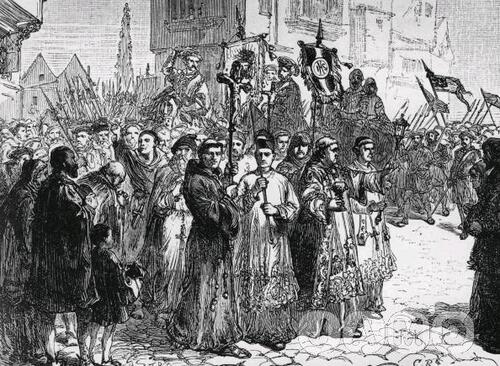
15 may 1556-John Knox, the Scottish Reformer, appeared in Edinburgh to face heresy charges.
15 May 1567 - Marriage of Mary Stuart and James Hepburn, Earl of Bothwell

source:wikipedia,http://www.onthisdayintudorhistory.com/,http://www.british-history.ac.uk/,http://queentohistory.blogspot.fr/,facebook.com/theanneboleynfiles
 votre commentaire
votre commentaire
-
14 May 1509-Ferdinand,king of aragon to Catherine,princess of wales
Declined to ratify the marriage with Prince Charles because he knew that the old King was neither his friend nor hers. Her marriage and that of Prince Charles secure the most important alliance of himself, the Emperor, Prince Charles and England; and therefore she must now show what she can do, and advise his ambassador, seeing that she once wrote that her marriage would be easy if the late King were to die. He and his kingdom are at the King of England's disposal if her marriage takes place. 14 May, 1509.

14 May 1264 - Battle of Lewes
The Battle of Lewes was one of two main battles of the conflict known as the Second Barons' War. It took place at Lewes in Sussex, on 14 May 1264. It marked the high point of the career of Simon de Montfort, 6th Earl of Leicester, and made him the "uncrowned King of England". Henry III left the safety of Lewes Castle and St. Pancras Priory to engage the Barons in battle and was initially successful, his son Prince Edward routing part of the Baronial army with a cavalry charge. However Edward pursued his quarry off the battlefield and left Henry's men exposed. Henry was forced to launch an infantry attack up Offham Hill where he was defeated by the Barons' men, defending the hilltop. The royalists fled back to the castle and priory and the King was forced to sign the Mise of Lewes, ceding many of his powers to Montfort.

14 May 1517 - Those arrested in the "Evil May Day" riots were paraded before the King, Queen, and their court in halters

14 May 1523 - Death of Nicholas Vaux, 1st Baron Vaux
He was a soldier and courtier in England and an early member of the House of Commons. He was the son of Lancastrian loyalists, Sir William Vaux of Harrowden and Katherine Peniston, daughter of George Peniston of Corticella.He grew up during the years of Yorkist rule, and served under Henry VII when he recovered the throne in 1485.
14 May 1536
Jane Seymour moved closer to the King and Cromwell updates the King's ambassadors in France on recent events.

Cromwell to Gardiner and Wallop.
The King has deferred answering their letters sent by Salisbury till the arrival of the bailly of Troyes. Has to inform them, however, of a most detestable scheme, happily discovered and notoriously known to all men. They may have heard the rumour of it. Will express to them, however, some part of the coming out, and of the King's proceeding. The Queen's incontinent living was so rank and common that the ladies of her privy chamber could not conceal it. It came to the ears of some of the Council, who told his Majesty, although with great fear, as the case enforced. Certain persons of the privy chamber and others of her side were examined, and the matter appeared so evident that, besides that crime, "there brake out a certain conspiracy of the King's death, which extended so far that all we that had the examination of it quaked at the danger his Grace was in, and on our knees gave him (God ?) laud and praise that he had preserved him so long from it." Certain men were committed to the Tower, viz., Marks and Norris and the Queen's brother; then she herself was apprehended and committed to the same place; after her Sir Fras. Weston and Wm. Brereton. Norris, Weston, Brereton, and Marks are already condemned to death, having been arraigned at Westminster on Friday last. The Queen and her brother are to be arraigned tomorrow, and will undoubtedly go the same way. "I write no particularities; the things be so abominable that I think the like was never heard. Gardiner will receive 200l. of the 300l. "that were out amongst these men, notwithstanding great suit hath been made for the whole; which though the King's highness might give in this case, yet his Majesty doth not forget your service; and the third 100l. is bestowed of the vicar of Hell [Sir Fras. Brian], upon [whom] (This word seems to be omitted. The despatch must have been hurriedly written, and two or three verbal errors have been overlooked.) though it be some charge unto you, his Highness trusteth ye will think it well bestowed." From the Rolls in haste, 14 May.

14 May 1571 -Death of Matthew Stewart.He was the 4th Earl of Lennox, and leader of the Catholic nobility in Scotland. He was the son of John Stewart, 3rd Earl of Lennox. His grandson was James VI of Scotland.
14 May 1595 - Death of Anne Fiennes or Fienes (née Sackville), Lady Dacre was an English gentlewoman and benefactress.
14 May 1629 - Death of Jean Gordon, Countess of Bothwell.She was a wealthy Scottish noblewoman and the first wife of James Hepburn, Earl of Bothwell who became, after his divorce from Lady Jean, the third husband of Mary, Queen of Scots. Lady Jean herself had a total of three husbands. Upon her second marriage, she became the Countess of Sutherland.

More history:
14 May 1483 - Coronation of Charles VIII of France
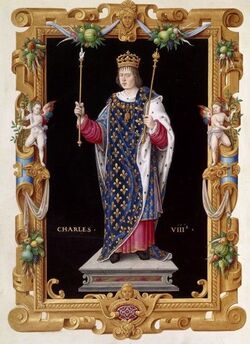
14 May 1509-At the Battle of Agnadello, the French defeat the Venitians in Northern Italy.
14 May 1553-Birth of Marguerite of Valois,("La reine Margot") queen consort of Navarre,wife of Henry IV
14 May 1610-Henry IV of France stabbed to death by François Ravaillac in the Rue de la Ferronnerie, Paris.

source:wikipedia,http://www.british-history.ac.uk/,http://www.thetudormonarch.com/,http://www.thetudorswiki.com/
 votre commentaire
votre commentaire
-
13 May 1515 - Marriage of Mary Tudor, Queen of France, and Charles Brandon, Duke of Suffolk at Greenwich
13 May 1536
Henry Percy, Earl of Northumberland, wrote to Thomas Cromwell
I perceive by Raynold Carnaby that there is supposed a pre-contract between the Queen and me; "whereupon I was not only heretofore examined upon my oath before the archbishops of Canterbury and York, but also received the blessed sacrament upon the same before the duke of Norfolk and other the King's highness' council learned in the spiritual law, assuring you, Mr. Secretary, by the said oath and blessed body, which afore I received and hereafter intend to receive, that the same may be to my damnation if ever there were any contract or promise of marriage between her and me." Newington Green, 13 May

J. Husee to Lord Lisle.
Here is no good to be done, neither with the King nor with any of his Council, till matters now had in hand be fully achieved. Mr. Secretary had no leisure to despatch the letter for the Friar's delivery. It is useless suing to Mr. Treasurer till he have more leisure. It is believed this matter will be rid by the end of next week. Here are so many tales I cannot tell what to write. This day, some say, young Weston shall scape, and some that none shall die but the Queen and her brother; others, that Wyat and Mr. Payge are as like to suffer as the others. The saying now is that those who shall suffer shall die when the Queen and her brother go to execution; but I think they shall all suffer. If any escape, it will be young Weston, for whom importunate suit is made. It is rumoured that Harry Webbe has been taken in the West country, and put in hold for the same cause. By Wednesday (May,17) all will be known. Sir Thos. Cheyne is named lord warden, some say by Mr. Secretary's preferment. My lord of Richmond is chamberlain of Chester and N. Wales, and Mr. Harry Knyvet, constable of Beaumaris. If Mr. Secretary keep promise your Lordship shall have something. Today Mr. Russell was in very sad communication with Mr. Whethill. I fear I have taken a wrong pig by the ear, but I shall know by his preferring of your affairs ere long. Mr. Brian is chief gentleman of the privy chamber, and shall keep the table. There is plain saying that the King will assign the groom of the stole from time to time at his pleasure. I trust you will remember Mr. Secretary with wine and letters, and also Mr. Hennage. The King comes not to Dover at this time. There shall be both burgesses and knights of the shire for Calais. Give credence to Goodall, and keep secret what he tells you. London, 13 May.
Sir Ralph Langforth to Henry VIII.
Petition for a grant of the farm of Stoke Bardolf, Gedling, Shelfford, and Carleton, late in the holding of Henry Norris, parcel of lord Lovell's lands.
Sir Francis Weston.
Debts owing by Sir Francis Weston at the time of his death, "as more plainly appeareth by a bill of the particulars written with his own hand."
Creditors:—My cousin Dyngley with my father, John Horseman, Barnarde my father's cook, Mr. Harve, Farfax, John Rutter, Wyngfyld, Browne the draper, Domyngo, Genenes (Jennings?), the page of the chamber, Peter Hoseer, Hocrofte, my lord of Wiltshire, William Horant, Pope, Bradbe the broderer, Brydges my tailor, Parson Robynson, "a poor woman that Hannesley of the tennis play had married for balls I cannot tell how much," Cornelius the goldsmith, Harde Derman at the gate, Henry Semer, Mr. Bryan, the King for 40l. and 50 mks., Mr. Locke, Henry Parcar, page, Thomas Dyer, Sir William Peccarynge, William the broderer for 35l., "whereon he has a gown, a coat, and a doublet of cloth of gold," my sadler, George Node, my shoemaker, Ambrose Barcar, Codale at Greenwich, Crester my barber, Richard Gresscham, Percake of the stable, Chr. Melyner, Askewe in Watlyngstrete, my lady Mosgrave 50l. whereon she has plate of mine, Jocelyne that was Mr. Norreys servant, John Norres, Secheper that playeth at the dice, Temple the fletcher, the King's broderer. Total, 925l. 7s. 2d.
"Father and mother and wife, I shall humbly desire you, for the salvation of my soul, to discharge me of this bill, and for to forgive me of all the offences that I have done to you, and in especial to my wife, which I desire for the love of God to forgive me, and to pray for me: for I believe prayer will do me good. God's blessing have my children and mine.
"By me, a great offender to God."

Queen Anne Boleyn’s household is broken up
13 May 1568 - Mary Queen of Scots is defeated by English at battle of Langside
13 May 1619 - Funeral of Anne of Denmark, queen and wife of James VI and I.
More history:
13 May 1254 -Birth of Maria of Brabant, queen of France
13 May 1390 -Death of Robert II the Steward, King of Scots
13 May 1497 - Pope Alexander VI excommunicates Girolamo Savonarola

13 May 1648-Execution of Margaret Jones of Plymouth.She was the first person to be executed for witchcraft in Massachusetts Bay Colony during a witch-hunt
source:wikipedia,http://www.british-history.ac.uk/
-
12 May 1521 - Martin Luther's books were burned by Bishop Fisher at Paul's Cross

A stained glass portrayal of Luther
12 May 1536
Trial of Sir Henry Norris, Sir William Brereton, Sir Francis Weston and Mark Smeaton
The trial took place at Westminster Hall.They were charged with high treason against the king, adultery with the queen and plotting king's death.Having been found guilty, they were all sentenced to be hanged, drawn and quartered.
Sir John Russell to Lord Lisle.
On behalf of the bearer, who has been sore troubled to his utter undoing unless Lisle will make him a victualler in his retinue. Today Mr. Norres and such other as you know are cast, and the Queen shall go to her judgment on Monday next. I have delivered the King your letters. I wonder your Lordship did not write to me that I might have made suit for you. Westm., 12 May.
John Husee to Lord Lisle.
I delivered your letter to Mr. Secretary, who promises to be your very friend. I could not see the King, but delivered his letter through Sir John Russell, who promises to consult with Mr. Secretary on your behalf; but there is no time to make suit till the matters now in hand be overblown. As to the friar (Mr. Secretary would they were all at the Devil), he shall be rid, but it will be tomorrow ere I have the letter for his despatch, which Goodall will bring, who will depart tomorrow night. You may tell Mr. Porter, Mr. Treasurer will meddle with no matter till this business be rid. Today Mr. Norrys, Weston, Bryerton, and Markes have been arraigned, and are judged to be drawn, hanged, and quartered. They shall die tomorrow or Monday. Anne the queen, and her brother, shall be arraigned in the Tower, some think tomorrow, but on Monday at furthest, and that they will suffer there immediately "for divers considerations, which are not yet known." Mr. Payge and Mr. W[y]at are in the Tower, but it is thought without danger of life, though Mr. Payge is banished the King's court for ever. A new Parliament is summoned to commence on Thursday in Whitsun week. Walter Skynner comes over to your Lordship with my Lord Chancellor's letters, to summon you and lord Grey, but you will not go without further licence. Here is one Hall, serjeant-at-arms, who desires much to speak with Mr. Degory Graynfyld. London, 12 May.
Thomas Howard, 3rd Duke of Norfolk was appointed Lord High Steward of England

12 May 1537 – John Hussey, Baron Hussey, was charged with treason for his part in the Pilgrimage of Grace.
Hussey was implicated along with his cousin as complicit in the 1536 uprising known as the Pilgrimage of Grace. Though Hussey denied participation in the rebellion, he was accused of conspiring to change laws and depose the king, and that he abetted those who made war on the king in October 1536.The charges may have been levied in part because of Hussey's Catholic sympathies,and because Hussey and his wife, having served 'Princess' Mary, were partisans on her behalf. Hussey was indicted and tried for treason, and found guilty by the House of Lords. He was beheaded in Lincoln in 1536,while his cousin, Thomas Darcy, was executed on Tower Hill
12 May 1553 - Marriage of Guildford Dudley and Lady Jane Grey

Artist's conception of the wedding of Lady Jane Grey to Lord Guildford Dudley, son of John Dudley, Earl of Warwick, Duke of Northumberland, and Lord Protector (advisor to Edward VI), in 1553. Based on original engraving by Devaria.
12 May 1641- Execution of Thomas Wentworth
He was an English statesman and a major figure in the period leading up to the English Civil War. He served in Parliament and was a supporter of King Charles I. From 1632–39 he was Lord Deputy of Ireland. Recalled to England, he became a leading advisor to the king, attempting to strengthen the royal position against Parliament. When Parliament condemned him to death, Charles signed the death warrant and Wentworth was executed.

More history:
12 May 1191-Marriage of Richard I Lionheart and Berengaria of Navarre
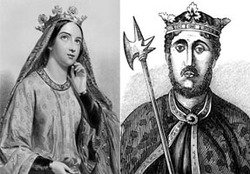
12 May 1588 – French Wars of Religion: Henry III of France flees Paris after Henry of Guise enters the city and a spontaneous uprising occurs.
12 May 1590 -Birth of Cosimo II de Medici, Grand Duke of Tuscany
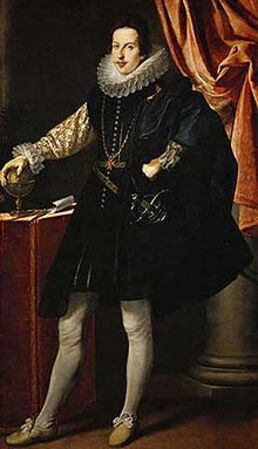
source:wikipedia;the anne boleyn files,http://www.british-history.ac.uk/









